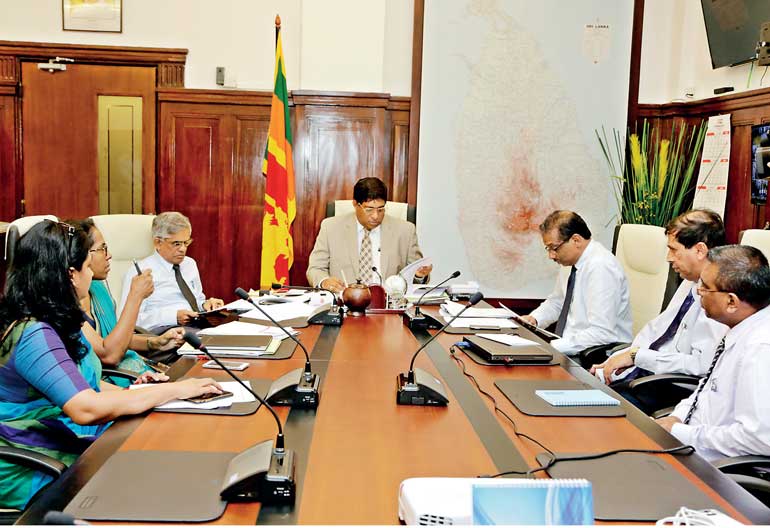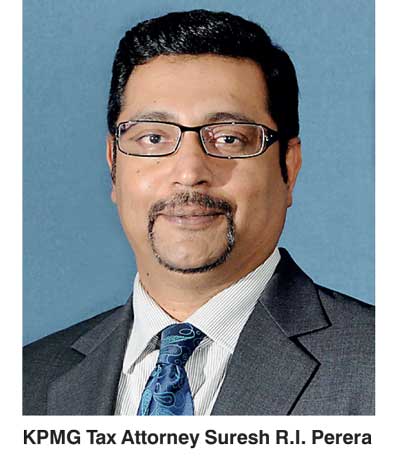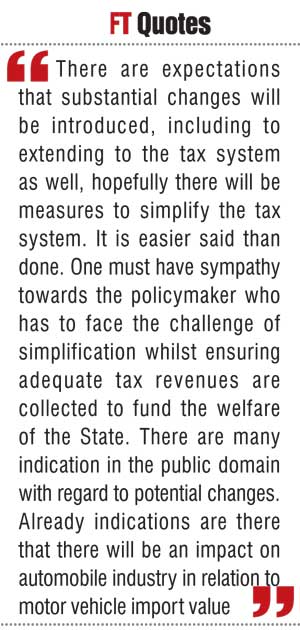Friday Jan 23, 2026
Friday Jan 23, 2026
Thursday, 19 November 2015 00:00 - - {{hitsCtrl.values.hits}}
 Final preparations in the formulation of the 2016 budget to be presented in Parliament on 20 November were being made at the Ministry of Finance earlier this week. Here Finance Minister Ravi Karunanayake, Secretary to the Ministry of Finance Dr. R.H.S. Samaratunga, Deputy Secretary S.R. Attygalle, Director General of the Department of Public Finance A.K. Seneviratne, Director General of the Department of National Budget A.R. Deshapriya, Director of Economic Affairs of the Ministry of Finance Dimuthu Samaratunga and Advisor, Income Tax of the Ministry of Finance Thanuja Perera at the meeting
Final preparations in the formulation of the 2016 budget to be presented in Parliament on 20 November were being made at the Ministry of Finance earlier this week. Here Finance Minister Ravi Karunanayake, Secretary to the Ministry of Finance Dr. R.H.S. Samaratunga, Deputy Secretary S.R. Attygalle, Director General of the Department of Public Finance A.K. Seneviratne, Director General of the Department of National Budget A.R. Deshapriya, Director of Economic Affairs of the Ministry of Finance Dimuthu Samaratunga and Advisor, Income Tax of the Ministry of Finance Thanuja Perera at the meeting
Q: The first full-fledged Budget by the newly-appointed united Government is scheduled on 20 November. What do you expect in the Budget reading?
A: There are expectations that substantial changes will be introduced, including to extending to the tax system as well, hopefully there will be measures to simplify the tax system. It is easier said than done. One must have sympathy towards the policymaker who has to face the challenge of simplification whilst ensuring adequate tax revenues are collected to fund the welfare of the State. There are many indication in the public domain with regard to potential changes. Already indications are there that there will be an impact on automobile industry in relation to motor vehicle import value.
Sri Lanka seems to be abandoning its 17-year-old concept of taxing value addition to be replaced with Turnover Tax. We have to keep our fingers crossed. There are signals of a change pertaining to corporate tax rate too. Hopefully the External Commercial Borrowing Scheme that was introduced under Exchange Control Regulations to borrow foreign loans up to $ 10 m per year (up to a maximum of $ 30 m) by a Sri Lankan will be extended as its coming to an end with effect from 31 December 2015 as this will also add value to the Government’s endeavour to attract the foreign currency.
The tide is against granting new tax holidays so one cannot expect any new ones. We can also expect the criticisms levelled against Land (restriction on alienation) Act being addressed. There may be some sort of relaxations for foreign investors to buy land and may be the land lease tax would also see a change going by the Prime Minister’s recent economic policy statement in the Parliament. Exporters and other foreign currency earners may also benefit going by the statement made by the Prime Minister. He mentioned that tax free concessions for all earning outside Sri Lanka for Sri Lankans and only the taxes are only for income earned within the country.
It would be suitable if the Budget contains a message with regard to FATCA affecting Sri Lankan financial institutions. In my view, most of us would like to see Sri Lankan Government executing an Intergovernmental Agreement with the US treasury this will reduce the compliance burden of the financial institutions. This is an important aspect of international trade.
Q: There are signals that VAT will be abolished and replaced with Turnover Tax in Budget 2016. What is the difference between VAT and TT?
A: Both are consumption taxes. VAT is a tax on the value addition by each person at different stages of the productions and supply chain and at the point of importation. VAT normally follows the ‘destination’ principle. In case of exports tax is levied at the point of destination. At the point of exports, no tax is levied. There are four methods of calculating the Value Addition but the most commonly used method is the invoice credit method, where output tax minus input tax mechanism is being used. That is VAT paid to supplier is given as a deduction from the VAT paid to the customers. This is effected by using the VAT invoice as a tool.
On the other hand TT mechanism entails application of the tax rate on the turnover of each person in the supply chain instead of value addition. When turnover is taxed in each point, this results in TT being levied on TT itself, what is called the effect of tax on tax or cascading effect. Because of this, VAT is considered more equitable and a fair tax,
Out of 196 countries in the world, more than 160 countries is following VAT. More than 25 countries in the Asian Region including Thailand, Taiwan, Cambodia, Laos, Pakistan and Bangladesh are following VAT only a handful of the 44 Asian countries follow sales tax.
Q: How are the foreign currency earners taxed at present?
A: While there is no Nation Building Tax on foreign currency earners, supplies of services to persons outside Sri Lanka to be utilised and consumed outside Sri Lanka are free of VAT subject to rules. However if the consumption/utilisation is in Sri Lanka, it will be subject to VAT. Exporters of goods are zero rated for VAT purposes.
Currently, Sri Lanka follows the residency basis for income tax. Residents pay income tax on local as well as foreign income subject to exceptions. But non-residents pay only on local income in Sri Lanka subject to certain rules. This is the same concept used by many countries where as USA imposes income tax based on the citizenship. A US person is liable to US income tax even if he is physically not present in the USA.
Therefore, Sri Lankan resident exporters of goods and services are liable to income tax subject to exceptions given in the Act. At present, resident who are service providers enjoy a tax exemption for foreign currency receipts under Section 13 ddd of the Inland Revenue Act subject to the rules. Exporters of non-traditional goods are generally taxes at 12% while some exporters such as gem and jeweller enjoy exemptions. Exporter of traditional goods such as black tea in bulk, crepe, sheet, latex rubber, fresh coconuts, etc., are taxed at 28%. Going by PM s statement the budget may give relief to all exporters.
Q: Is Sri Lanka’s corporate tax rate too high?
A: Sri Lanka’s current standard corporate tax rate is 28% whilst concessionary rate applicable on exports of non-traditional products, SMEs, agriculture, tourism, healthcare, etc. is 12%. Other than these two rates that are applicable widely 40% rate is imposed on tobacco and alcohol whilst 10% is applicable on educational services, maintenance of facilities for storage, development of software, or supply of labour, to ship operator, ship builder or any agent of a foreign ship if they provide skilled training, etc.
When we are discussing whether the rate too high we should also note that before 2011, Standard Corporate tax rate used to be 35%.
In the Asian region the average income tax rate for 2015 is 21.91%. The average global income tax rate is 23.64%. So, when we compared to global and Asian averages our income tax rate of 28% seem to be still high. On the other hand I am not sure whether this is the right time to think of reducing the income tax rate further in the context of the very unhealthy tax to GDP ratio and unsatisfactory direct to indirect tax collection ratio of 20:80. In 2008, the tax to GDP ratio was 13.3% while now it has fallen below 11%. As per Prime Minister’s recent policy statement government is planning to achieve 40:60 direct to indirect tax ratio by 2020. I don’t think we could reduce corporate income tax rate immediately to be par with Asian or global average
Q: Shouldn’t Sri Lanka extend tax holidays to attract FDI?
A: Well Sri Lanka has extended tax holidays for new undertaking from 2011 under Section 17A and 16 C of the Inland Revenue Act. The tax holidays ranged from four to 12 years depending on the amount of investment. The Government policy from recent times have been to slash tax holidays and to provide incentives for investments have been extended by way of tax credits, accelerated depreciation, reduced income tax rates, etc.
However, a widely appreciated school of thought is that consistent and transparent tax climate of country contributes more towards attracting investors than tax holidays. Hence the objective of the Government should be to create a transparent consistent tax climate along with a one stop shop to handle investor requirements. Furthermore the policy makers should work towards enhancing investor confidence in the tax climate of the country.
Q: Sri Lanka is looking up to be on par with Dubai and Singapore. What are the points to note in these countries from tax perspective?
A: Dubai does not have comprehensive tax system, it has income tax decrees enacted by each emirate. In practice only foreign banks and oil companies are subject to income tax. It does not have indirect taxes such as VAT on turnover tax. Instead of indirect taxes Dubai gathers revenue by imposing levies on usage of infrastructure.
Singapore also has more than 75 Double Tax Avoidance Agreements. Sri Lanka currently has entered in to 42 Double Tax Treaties. On the other hand Singapore has a tax system including income tax, property tax, stamp duty and Goods and Services Tax (GST) the equivalent of Sri Lanka’s VAT. 
In the World Bank’s Ease of Doing Business index one of the criteria’s that is assessed is the ‘Ease of paying taxes’. Dubai is ranked No. 1 in the World Bank’s ‘Ease of Paying taxes’ index, Singapore is ranked No. 5, whilst Sri Lanka is ranked at 158. But the Dubai tax system cannot be compared with the Sri Lanka tax system. Compared to the Sri Lankan tax system, the Singapore tax system is simple. Our VAT system has more than 140 exemptions while the Singapore GST has only three exemptions.
The main reasons that Singapore are way ahead is that most of the taxes/levies are online and the time (hours) to be spent on tax payment is minimal. As per the World Bank ‘Ease of Paying Taxes Index’, in Singapore there are only six tax payments for the year and the hours to be spent during a year is only 83 hours. In Dubai, there is only four payments of levies/fees due in a year and the time spent on such payments on average for a year is only 12 hours. Imagine you need to spend only half day to make the due payments of levies/fees for a year. Such facilities are a boon for investors and would encourage them to route investments to such countries. As per the World Bank index, Sri Lanka has 47 payments during a year, while practically it is much more. As per the index in Sri Lanka, one should spend 167 hours a year for processing of tax payments. Well it is easy to the math to see how far behind Sri Lanka is from the frontiers.
The fact that RAMIS is being introduced may ease out the burden to some extent. However the policy makers should consider cutting down the number of taxes a tax payer has to bear and also the administrative hassle of making payments. For an example early last year, the VAT payments due monthly was changed to twice a month which created additional burden for tax payers. There seems to be a lot of expectation that the tax system will be simplified during the 2016 Budget.
Q: What are the anomalies in the Sri Lanka’s tax collection and tax mix?
A: As per the Reports published by Ministry of Finance and Planning, Sri Lanka tax collection ratio is 20% (direct) and 80% (indirect tax). Direct Taxes are typically based on the tax payer’s ability to pay while the indirect tax is a regressive tax where any person upon consumption of goods and services would be liable to the indirect tax.
The imposition of indirect taxes results in a disproportionate contribution towards tax relative to one’s income. In the Prime Minister’s policy statement there was a reference to change this ratio to 40% 60% in the medium term by strengthening the tax management processes while removing tax holidays and benefits.
As you all know, the main challenge is to improve the countries tax to GDP ratio. In other words there has to be additional tax collection to state coffers, to improve this. The question is where this additional tax revenue going to come from.
As per the Inland Revenue Department Performance reports of 2012 the income tax collection from corporate is 49% while the rest is from non-corporates including individuals. This leads to the issue of efficient allocation of resources of the Inland Revenue Department on the basis of a cost benefit analysis.
Q: What should be done to improve the tax system in Sri Lanka?
A: Improving the tax system means improving both the tax policy as well as tax administration. A good tax system should demonstrate certain aspects. Equity, that is, tax should be imposed on ability of each persons to make payments with broad shoulders bearing more weight. There should be Certainty and convenience of payment with regard to quantum and time of payment.
Sri Lanka has a fascinating web of taxes coupled with treaties with over 42 countries to eliminate double taxation. In order to improve certainty, whilst retrospective legislation and ambiguous legislation should be avoided, introduction of an independent ruling authority as a new institution into our tax structure would go a long way to improve the certainty. Also, a welcome move would be introduction of the tax ombudsman in to our tax system. This should be by way of an Act of Parliament with sufficient teeth being given to tax ombudsman to look in to malpractices and take corrective actions. Tax Ombudsman roles is not for looking at technical interpretations.
From the point of view of economy of collection and in the context of elimination of tax avoidance another welcome move will be the introduction of withholding tax mechanism for service payments which in fact prevalent sometimes back. Of course, the answer for delays and inefficiencies in the tax administration is the use of technology and automation. This also includes training the existing cadre at the tax office to use the technology. With RAMIS, hopefully we could expect a drastic improvement in the efficiency of Inland Revenue department and the entire tax administration. Apart from these, there should advance training extended to officers of the Inland Revenue Department on tax technical aspects. This includes areas such as international tax and new tax concepts that are gaining momentum such as transfer pricing.
There should be more awareness among the general public as well. Apart from deliberate tax avoidance another reason for non-compliance with the tax rules is the ignorance of the taxes by the general public. For example, though there are many tax incentive provided to SMEs we find that they are not aware of the same. Therefore there should be more intensive measures for creation of tax awareness country wide.